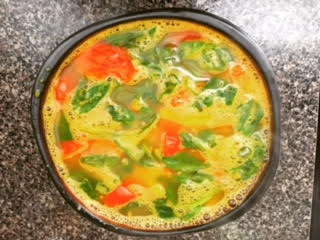 As winter-like weather made its way into the Northeast a few weeks ago, temperatures dropped and my immune system took a beating. I first developed the telltale scratchy throat and sore back of the mouth. Then, a runny nose transformed into a full-blown cold. A week or two later, I had a raging sinus infection with the barking threat of bronchitis. Determined to avoid antibiotics this time around–despite religiously taking probiotics, two rounds of medication after a rough bladder infection ultimately helped to weaken my immune system overall–I have been fighting the onslaught of pathogens naturally with nutrient-dense foods and tasty beverages packed with antioxidants. In addition to the fire cider drink (for which I will share a recipe next week), I largely credit the super spicy veggie soup I concocted on the fly two weeks ago for helping me to maintain the upper hand on my health.
As winter-like weather made its way into the Northeast a few weeks ago, temperatures dropped and my immune system took a beating. I first developed the telltale scratchy throat and sore back of the mouth. Then, a runny nose transformed into a full-blown cold. A week or two later, I had a raging sinus infection with the barking threat of bronchitis. Determined to avoid antibiotics this time around–despite religiously taking probiotics, two rounds of medication after a rough bladder infection ultimately helped to weaken my immune system overall–I have been fighting the onslaught of pathogens naturally with nutrient-dense foods and tasty beverages packed with antioxidants. In addition to the fire cider drink (for which I will share a recipe next week), I largely credit the super spicy veggie soup I concocted on the fly two weeks ago for helping me to maintain the upper hand on my health.
There are few things that soothe an upper respiratory infection better than hot soup, especially when bone broth is at its base. My recipe uses nourishing bone broth, nutrient-dense vegetables and health-promoting spices to help combat colds and other respiratory infections. Rich in glycosaminoglycans (GAGs), bone broth helps the gastrointestinal tract form and repair the defensive barrier in the mucosa to nourish healthy bacteria. GAGs block unhealthy bacteria and play a vital role in regulating the immune response. Bone broth also contains glutamine, which stimulates function of immune cells, the proliferation of lymphocytes, and production of cytokines, in turning knocking out bacteria.
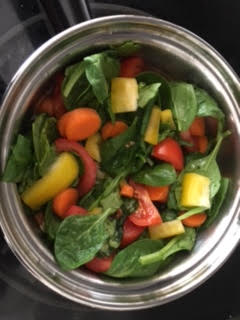 Spinach is extremely rich in Vitamin A (in the form of carotenoids), which supports the immune system in fighting infection by creating white blood cells that kill harmful bacteria and viruses. Vitamin A also aids in maintaining healthy mucus membranes. Spinach is also a good source of antioxidants, including manganese, vitamins E and C. Both manganese and zinc play a vital role in defending the body from invasive bacteria. Research has revealed that vitamin C can help control infections, boost resistance against upper respiratory tract infections and reduce elevated inflammation levels. Studies show that this vitamin stimulates the production and function of white blood cells (leukocytes), particularly those that kill infected cells and that destroy disease-causing agents (pathogens), like bacteria, which cause the majority of upper respiratory infections.
Spinach is extremely rich in Vitamin A (in the form of carotenoids), which supports the immune system in fighting infection by creating white blood cells that kill harmful bacteria and viruses. Vitamin A also aids in maintaining healthy mucus membranes. Spinach is also a good source of antioxidants, including manganese, vitamins E and C. Both manganese and zinc play a vital role in defending the body from invasive bacteria. Research has revealed that vitamin C can help control infections, boost resistance against upper respiratory tract infections and reduce elevated inflammation levels. Studies show that this vitamin stimulates the production and function of white blood cells (leukocytes), particularly those that kill infected cells and that destroy disease-causing agents (pathogens), like bacteria, which cause the majority of upper respiratory infections.
Carrots are a potent source of phytonutrient antioxidants–most notably, beta-carotene, which converts into vitamin A. Among other health benefits, beta-carotene is a powerful immunity enhancer. Carrots have also demonstrated powerful antibacterial and antimicrobial properties.
Bell peppers are also packed with antioxidants, including vitamin C and more than 30 different kinds of carotenoids. The class of phytonutrients called carotenoids are the yellow, orange, and red pigments synthesized by plants, algae and photosynthetic bacteria. Alpha-carotene, beta-carotene, lycopene, lutein, cryptoxanthin and zeaxanthin are some of the most common carotenoids that are found in bell peppers. Carotenoids are vital in the activation and regulation of the immune system and may help target and destroy disease-causing bacteria and viruses.
Tomatoes are most famously known for being the biggest source of the carotenoid lycopene. Lycopene has antioxidant and anti-inflammatory benefits. A 2008 study found that lycopene may improve lung function in asthmatics, helping to reduce lung inflammation and the production of phlegm.
Now that we’ve taken care of the vegetables, we move onto the cause of the heat in this spicy veggie soup. The kick of cayenne pepper comes from the pain-reliever capsaicin, which also helps to break up and clear congested mucus from the nose and lungs. Cayenne pepper also is a good source of the “anti-infection” vitamin A. This vitamin is also required for healthy epithelial tissues including the mucus membranes lining the lungs, nasal passages and intestinal tract. The heat of cayenne pepper is a natural stimulant for the circulatory and digestive systems, and it promotes sweating, helping to detoxify the body. Cayenne also encourages healthy digestion by creating hydrochloric acid in the stomach, as well as aiding peristalsis, or the involuntary muscular movement of food through the digestive tract, and increase nutrient absorption. With 70 percent of your immune system residing in your gut, it makes sense to keep the digestive system healthy and functioning at its best when battling an infection.
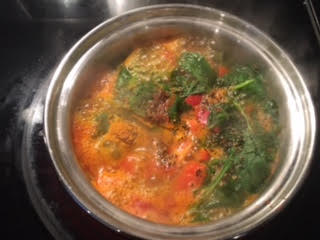 Next, we move on to turmeric, which has one of the highest antioxidants and anti-inflammatory properties of consumed foods. With inflammation at the root of much disease in the human body, turmeric is a superpower spice one should use on a daily basis. Turmeric can target the fever and body ache of flus, while relieving sore throat, cough, and other symptoms of the common cold. Curcumin, the active ingredient in turmeric, has anti-viral and anti-fungal characteristics, and it helps modulate the immune system by activating the white blood cells that target and destroy foreign pathogens. Oregon State University reported in 2012 that researchers discovered that curcumin nearly tripled the expression of a gene that encodes the cathelicidin antimicrobial peptide (CAMP) protein, which aids in combatting bacteria, viruses and fungi not previously encountered by the immune system. Additional research shows curcumin is a powerful antioxidant that interacts with and suppresses free radicals and modulates levels of a vital antioxidant called glutathione, which along with curcumin, is protective against oxidative stress and free radicals, as well as metal toxicity.
Next, we move on to turmeric, which has one of the highest antioxidants and anti-inflammatory properties of consumed foods. With inflammation at the root of much disease in the human body, turmeric is a superpower spice one should use on a daily basis. Turmeric can target the fever and body ache of flus, while relieving sore throat, cough, and other symptoms of the common cold. Curcumin, the active ingredient in turmeric, has anti-viral and anti-fungal characteristics, and it helps modulate the immune system by activating the white blood cells that target and destroy foreign pathogens. Oregon State University reported in 2012 that researchers discovered that curcumin nearly tripled the expression of a gene that encodes the cathelicidin antimicrobial peptide (CAMP) protein, which aids in combatting bacteria, viruses and fungi not previously encountered by the immune system. Additional research shows curcumin is a powerful antioxidant that interacts with and suppresses free radicals and modulates levels of a vital antioxidant called glutathione, which along with curcumin, is protective against oxidative stress and free radicals, as well as metal toxicity.
Mixing turmeric with black pepper and healthy fats, like olive oil, increases the body’s absorption of curcumin significantly. Like cayenne pepper, black pepper signals the stimulation of hydrochloric acid secretion by the stomach, improving digestion. Black pepper also has diaphoretic properties–aka, it stimulates sweating. Rich in manganese, this heat-promoting spice also has considerable antibacterial and antioxidant benefits.
Finally, extra virgin olive oil also shines in the antioxidant department. A power ant-inflammatory, olive oil contains the antioxidant oleocanthal, which, according to Authority Nutrition, has been shown to function similarly to ibuprofen. Recent research has also supported the digestive health benefits of olive oil. The World’s Healthiest Foods cites: Numerous polyphenols in olive oil have been shown to slow the growth of unwanted bacteria, including bacteria commonly responsible for digestive tract infections, like H. Pylori. Additionally, olive oil has been demonstrated to boost cognitive function, help to balance to the nervous system and perhaps too help clear the foggy mind that comes with sinus congestion.
Clearly, this soup is supremely nutritious and filled with potent spices and vegetables to help boost immune function and fight infection. I have also found it quite delicious, enough so that I’ve enjoyed it multiple days in row. Best of all, I’ve felt the benefits almost immediately, with my lungs, throat and sinuses clearing almost as soon as a couple of spoonfuls are down my stomach. I sincerely hope it helps you too get over the wintertime cold and flu.
Super Spicy Veggie Soup
INGREDIENTS:
- 24 ounces of Pacific Organic Bone Broth (turkey or chicken)
- 3 cups of water
- 3 cups of spinach
- 6 Campari tomatoes
- 3 full-length carrots
- 1 red, yellow or orange bell pepper
- 2 tbs cold-pressed, extra virgin olive oil
- 1 tbs cayenne pepper
- 1 tbs turmeric
- 1 tsp black pepper
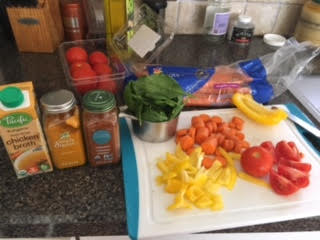
INSTRUCTIONS:
1. Put water, olive oil and spinach into a pot.
2. Cut the carrots in fairly thin slices widthwise. Slice the tomatoes crosswise in half, then lengthwise in quarter and even eighth them, if you choose. Cut the pepper in thin, medium-long slice.
3. Toss vegetables into pot.
4. Add seasonings and stir.
5. Turn stove onto medium to medium-high heat. Cook until vegetables start to get tender, but not wilted. Stir occasionally.
6. Soup makes 4-6 large servings. It may be served by itself, and it is extremely flavorful, nutritious and delicious. However, you may find that you want to add some meat to make the meal more substantive and filling. I chose to fry up six links of spicy Italian sausage, slice them up and add them to the mix before cooking the soup.
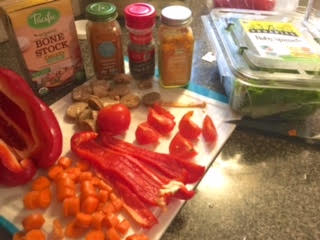
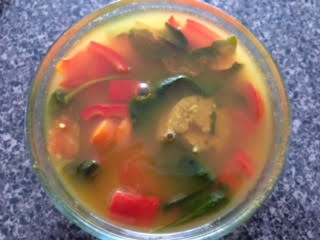
[…] for breakfast, in the immune-boosting, anti-bacterial and anti-viral Fire Cider drink or in my Super Spicy Veggie Soup, which I make frequently during cold and flu season to use additionally as a nutritious and […]